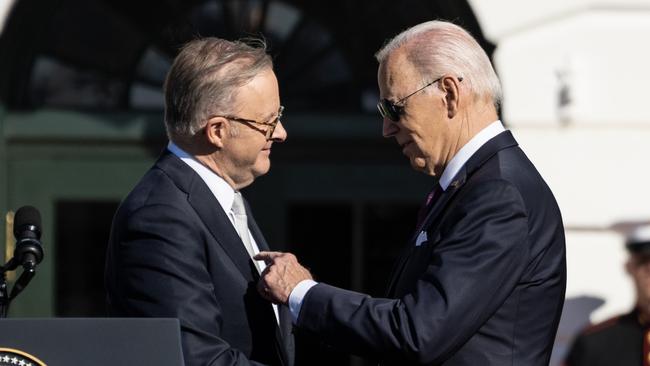
Mr Trump nevertheless cast a shadow over Anthony Albanese’s state visit to Washington, which by traditional measures has been a resounding success: no snafus, obvious personal bonhomie between the two leaders, and a raft of announcements chock full of buzzwords about cybersecurity and climate change.
The former president, if re-elected late next year, could yet derail the AUKUS security pact, which is yet to enjoy the endorsement of congress, a body which elected a Trump ally as Speaker, Louisiana congressman Mike Johnson, on Wednesday (Thursday AEDT).
Former prime minister Malcolm Turnbull had to fight hard to stop the former president from slapping tariffs on Australian exports to the US. And Mr Trump was loath to honour a promise made by the Obama administration to Australia that it would help Australia take in refugees.
Mr Johnson sided with Mr Trump in 2020 over the latter’s unproven claim he was cheated out of the 2020 election.
The risk for Australia is if the AUKUS security pact, however irrationally, becomes viewed by Trump Republicans as part of the Democratic Party’s agenda, one that the GOP if returned to the White House wouldn’t care to delay, if it could be sold as a populist, isolationist bid to protect American technology and prevent the US from becoming enmeshed in foreign wars.
Australian officials believe a second-term president Trump wouldn’t jettison the AUKUS security pact, arguing the world- famous businessman would see the financial benefit to the US of Australia’s promises to help subsidise the upgrade of US submarine shipyards.
But that’s no certainty: the US has in effect promised to sell Australia around 10 per cent of its submarine fleet by the early 2030s.
At his press conference in the White House, Mr Biden understandably baulked at providing a personal guarantee that congress would pass the necessary amendments to operationalise AUKUS before the end of his term. That may have been wise: the White House can’t force congress to approve the requisite changes.
Certainly, Australia’s billionaire manufacturing magnate Anthony Pratt, to whom Trump allegedly revealed military secrets first-hand at Mr Trump’s Mar-a-Lago residence in 2021, would no longer be a pro-Australia sounding board for the landmark security pact, given his public humiliation by the former president.
For all Trump’s absence from the news, he has a greater chance of returning to the White House in 2025 than President Joe Biden has of remaining in it, according to the average of the current odds in political betting markets compiled by RealClear Politics.




Probably for the first time in seven years, and certainly for the longest time since his presidential campaign kicked off in 2015, former president Donald Trump has all but dropped out of the news cycle, pushed aside by the atrocities in Israel as the world braces for the Jewish state’s military response and the prospect of a wider Middle East war.